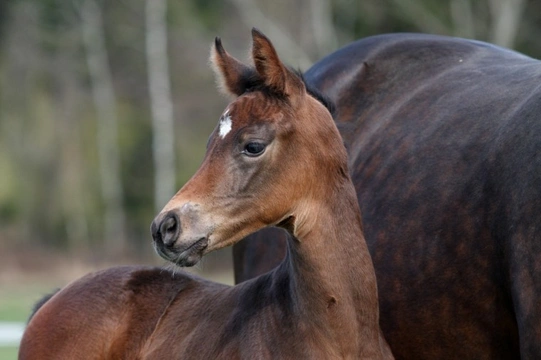
What is Equine Herpes Virus and do you need to vaccinate against it?
There are nine types of Equine Herpes Virus also called Equine Rhinopneumonitis but the most important strains are EHV 1 and EHV 4. These are the only two against which there is a vaccination. Both EHV 1 and 4 can cause an upper respiratory tract infection in horses a bit like flu but they can also create abortion in pregnant mares and neurological disease which can lead to paralysis although this is rarer. EHV is highly infectious and is found right the way across the world.
Vaccinating against the Equine Herpes Virus has historically only been of interest to breeders and stud owners to protect in-foal mares but recently, in the south of England, there have been outbreaks of EHV with at least one fatality.
How to spot the Equine Herpes Virus – early signs and symptoms
The signs of EHV are quite similar to Equine Flu but hopefully, your horse is vaccinated against flu and so is less likely to catch it or only show very mild symptoms. Some of the sign of EHV include:-
- Disinterest in food
- Discharge from the nose
- Coughing
- Enlarged glands
- A raised temperature
Treatment for the respiratory form of the disease is similar to managing horses with flu; it is supportive with perhaps medication to lower temperature and sometimes antibiotics if there are secondary bacterial infections.
- Neurological signs which are caused by EHV1 and EHV 4 in the early days might include:-
- A decrease in energy levels
- Unsteady or wobbly hind limbs, poor coordination
- An inability to lift the tail and pass droppings or urinate
- Head tilt
Treatment for horses affected by this form of the virus is very difficult but would include anti-inflammatories, IV fluids and possibly manual support using slings but most horses would require hospitalisation to have the best chance of a happy outcome. However, if paralysis occurs then there is usually only one option on welfare grounds and that is euthanasia.
In breeding stock, EHV 1 and occasionally EHV 4 can cause single or multiple abortions in mares which occur during mid to late pregnancy. It can also induce premature birth from which foals rarely survive and full-term stillbirths. It is essential that the mare is isolated from all the other pregnant mares because the foal or foetus, placenta, bodily fluids and the mare herself are all potential sources of great contamination putting other mares at risk’
Like Equine Influenza, EHV can spread easily and quickly and owners should isolate any suspect horse and close the yard to any horses either coming in or going out for at least 28 days. Older horses can carry EHV without demonstrating any signs and some horses when they contract EHV show few symptoms and are just mildly unwell. There has been a recent outbreak at a centre in Hampshire at which four horses died so owners are rightly concerned about this disease. At the moment, vets are not advising owners to vaccinate unless they are breeding but to maintain good management practices which help to protect against other equine diseases such as equine flu and strangles as well.
How is the Equine Herpes Virus spread?
EHV is spread like flu, through horse to horse contact so touching noses and by aerial droplets which travel further afield via coughing and snorting. It can also be spread on equipment belonging to both the horse and the handler. In the event of an in-foal mare miscarrying or aborting a foal, then EHV can be spread via the placenta.
EHV can sit dormant in horses without any external signs. It is almost impossible to tell if a horse is a carrier which is why the disease can spread so easily. They spread the virus by ‘shedding’ usually only in times of stress so travelling or competition or if they are ill with another disease or condition.
Vaccinations
Vaccination is currently recommended for studs and breeders and also youngstock under five years of age who are particularly susceptible to respiratory disease caused by EHV 1. There are vaccines which protect against the respiratory elements of both EHV 1 and EHV 4 but there is nothing available at the moment which offers protection against the paralysing strain.
The protocol for the vaccines in non-breeding stock is similar to those for Equine Influenza:-
- A primary course of two vaccinations which can be given to any horse once they have reached five months old with 4-6 weeks between the two injections
- A booster every six months starting within six calendar months of the second injection in the primary course
- In-foal mares should receive an injection if months five, seven and nine of the pregnancy
EHV is not a notifiable disease
Following the recent outbreak of EHV, there have been calls within the equestrian industry for the disease to be given notifiable status. There are big impacts on competitive sport far beyond just the breeding industry. The Duke of Beaufort’s stables at Badminton House which are used to house the international event horses for the Badminton Horse Trials had to be emptied and deep cleaned after one resident horse was found to have the virus. The stallion parade which usually takes place on the first two days of the event has been cancelled as a precaution as well.
But the head of the British Equine Veterinary Association (BEVA) has said that the government has neither the funds nor the appetite to make EHV a notifiable disease because it presents no danger to human health, has no impact on international trade and there is no duty to control it.



